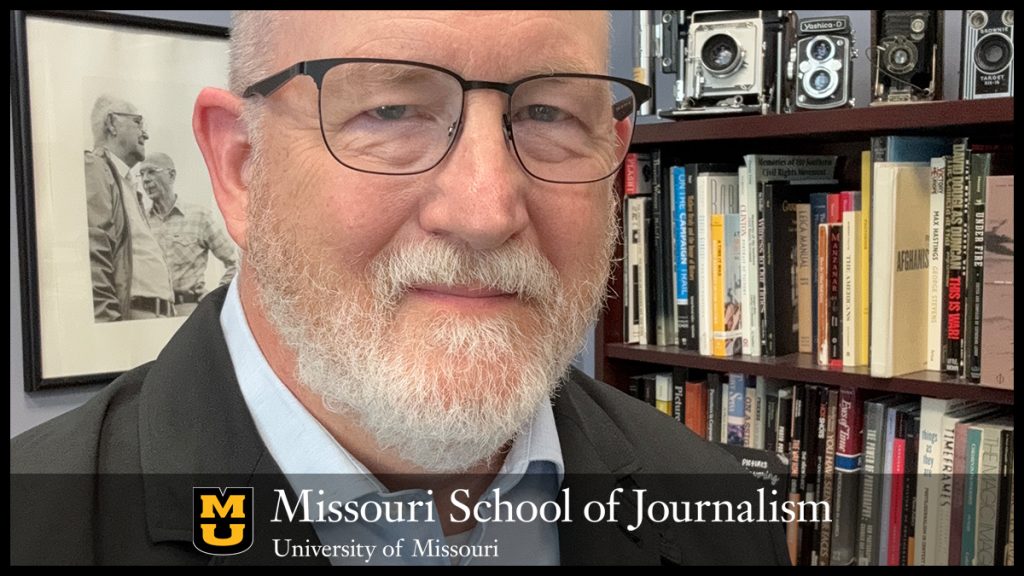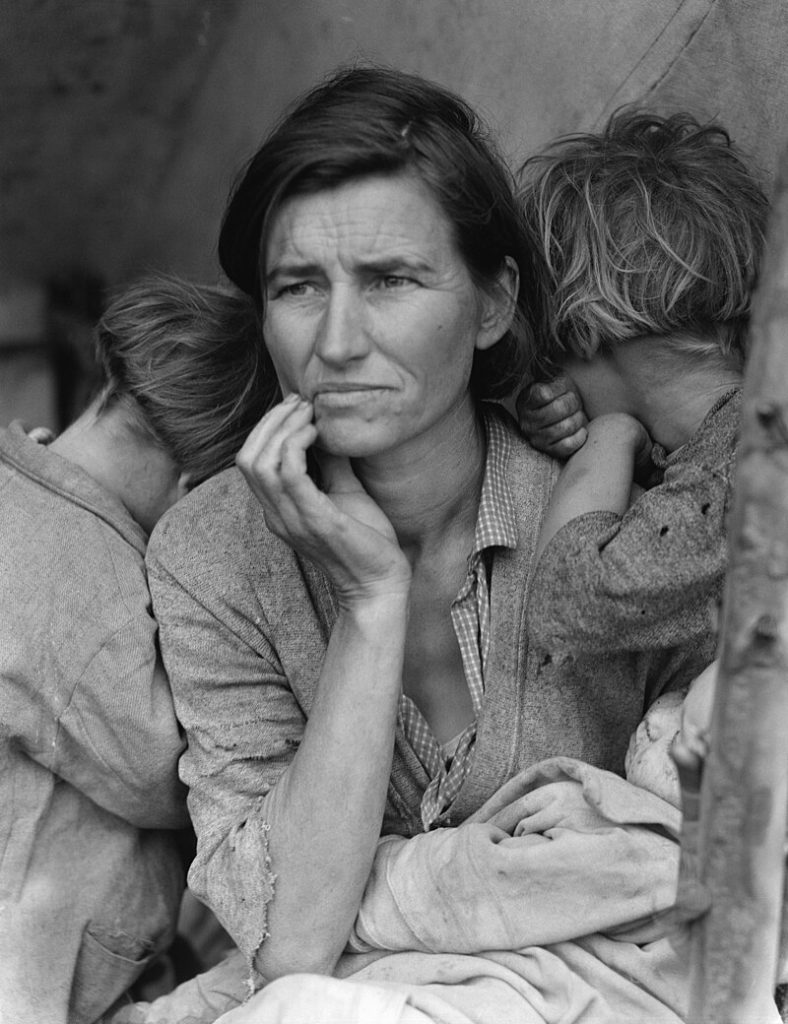Keith Greenwood earns national AJHA teaching award

The award recognizes Greenwood’s approach to making journalism history relevant
COLUMBIA, Mo. (Aug. 20, 2025) — Keith Greenwood, an associate professor at the Missouri School of Journalism, will receive the 2025 National Award for Excellence in Teaching from the American Journalism Historians Association (AJHA).
The award recognizes excellence in teaching journalism and mass communication history at a collegiate level.
“Keith’s commitment to his students and his hands-on approach to journalism history make him an outstanding choice for this national award,” said David Kurpius, dean of the School of Journalism. “In helping students approach their work with a keen understanding of connections between the past and present, he is having a profound impact on the next generation of journalists.”
This is not the first time Greenwood, whose teaching revolves around the history of journalism and photojournalism, has earned recognition from the AJHA. In 2022, the organization awarded him a $12,500 grant to study the photojournalistic history of the military newspaper Stars and Stripes. And in the words of Amy Lauters, chair of the AJHA Education Committee, returning to honor Greenwood was “an easy call.”
“The committee noted the many years of dedicated teaching, particularly in the realm of history and photojournalism, and Dr. Greenwood’s emphasis on centering practice in historical context,” Lauters said. “We are thrilled to offer him this award.”
For Greenwood, the honor stands as validation of his approach to helping students learn a knowledge-gathering process rather than simply memorizing facts.
“It’s not that I want a student to come out of a class and say, okay, I learned this thing,” said Greenwood, who also won an award for writing-intensive teaching in 2016. “I want them to get that process in their mind of, well, why did I learn this thing and where did it come from? What is the context that shaped how this came about?”
That style of teaching is, in part, a response to his early memories of taking history classes that stressed rote memorization of names and dates. In fact, it wasn’t until his pursuit of a master’s degree in journalism at Michigan State University — which he earned in 1992 before later receiving a doctorate from the School of Journalism — that he was exposed to classes that approached the subject differently, opening his mind to the potential of journalism history as a discipline.
“Steve Lacy at Michigan State University was talking to me about the Farm Security Administration photo project of the 1930’s and 40’s, and I didn’t really know much about it at that point,” he said, referencing a U.S. government project that photographed rural and urban living conditions from 1935 to 1944 and produced indelible images like Dorothea Lange’s famous Migrant Mother. “It wasn’t even a history course, but what he was talking about in class brought in that context — the idea that journalism doesn’t happen in a vacuum. And that was the lightbulb moment. It completely changed my perspective.”
Now, Greenwood is the one changing perspectives at a school that, unlike some others, requires students to take a journalism history course to graduate. And whether he is teaching about the evolution of camera technology or news coverage of the Vietnam War, one of his goals is to help new generations understand that even those events and stories that seem brand new have a history.
For his photojournalism history class, he emphasizes this idea by asking students to research a historic picture and explain why it looks the way it does, not only jump-starting discussion of photographic technology but making a larger point about the importance of the context that history provides.
“Every generation is susceptible to the idea that, ‘hey, this is new,’” he said. “If they don’t understand the history, then it seems new, but a solid grounding in history gives them a different perspective. So when they are starting to cover a political movement, a social movement or an issue in their community, they have something in the back of their mind saying, ‘I know something similar was covered in the past. What are the unresolved questions that I need to dig into?’”
Speaking of history repeating itself, Greenwood is the third School of Journalism faculty member to receive this teaching honor from the AJHA since the award’s inception in 2008. Earnest Perry, now the School’s associate dean of graduate studies and research, received the award in 2013, and Curators’ Professor Emerita Betty Winfield received the inaugural award in 2008.
“As a teacher, [Greenwood] brings history to life,” Perry wrote in support of Greenwood’s nomination. “Through his visual scholarship, he connects the past to the present so that his students can better understand their futures. The work he does is vital and should be rewarded.”
The AJHA will officially present the award to Greenwood during the AJHA national convention in Long Beach, California, which will run from Sept. 25-27.
Updated: August 20, 2025
Related Stories
Expand All Collapse All-
- Nov 14, 2016 Alumni, Faculty Recognized by Mizzou Alumni Association
- Jul 25, 2016 Faculty, Students, Alumni to Present Almost 90 Papers at Global Conference
- Jul 12, 2016 Again: Missouri Students, Faculty, Staff Celebrate 560-Plus Annual Awards and Honors
- Apr 13, 2016 Keith Greenwood Recognized for Excellence in Writing Intensive Teaching
- Mar 22, 2016 Earnest Perry Named New Associate Dean for Graduate Studies
- Mar 10, 2016 Dear J-School
-
- Sep 04, 2013 American Journalism Historians Association to Recognize Professor Earnest Perry with Its National Award for Excellence in Teaching
- Aug 14, 2013 A Record Breaker: Missouri School of Journalism Faculty, Students and Alumni Present 114 Papers at International Conference; 11 Earn Top Paper Awards
- May 15, 2013 Curators' Professor Emerita Betty Winfield Receives Outstanding Alumni Award in Education from the University of Arkansas
-
- Oct 24, 2011 Dean Mills and Lewis Diuguid, BJ '77, Honored by American Journalism Historians Association
- Sep 06, 2011 Missouri Journalism Professor Betty Winfield to Be Inducted into Alumni Hall of Fame at the University of Washington
- Apr 12, 2011 Earnest Perry Selected for Summer Institute at Harvard University
-
- Nov 24, 2009 Five Students Present Papers; Perry Elected President; Winfield Receives Kobre Award at the American Journalism Historians Association Convention
- Sep 30, 2009 Betty Winfield to Receive the Sidney Kobre Award for Lifetime Achievement in Journalism History
- Sep 23, 2009 Earnest Perry to Assume Presidency of the American Journalism Historians Association
- May 29, 2009 Betty Houchin Winfield Wins $10,000 O.O. McIntyre Professorship for Teaching Excellence
